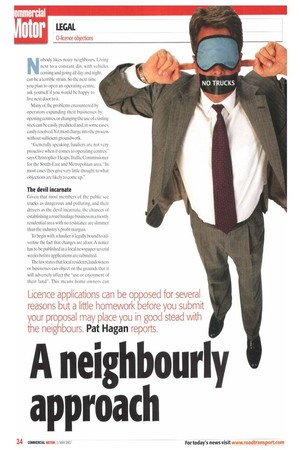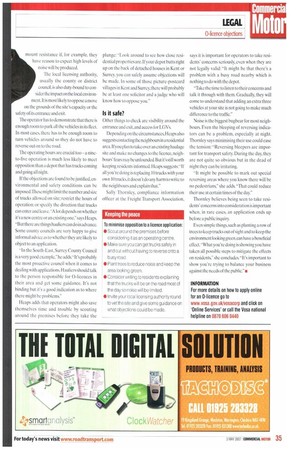A neighbourly approach
Page 34

Page 35

If you've noticed an error in this article please click here to report it so we can fix it.
Licence applications can be opposed for several reasons but a little homework before you submit your proposal may place you in good stead with the neighbours. Pat Hagan reports.
Nobody likes noisy neighbours. Living next to a constant din, with vehicles coming and going all day and night, can be a terrible strain. So the next time you plan to open an operating centre, ask yourself if you would be happy to live next door toil.
Many of the problems encountered by operators expanding their businesses by opening centres, or changing the use of existing sites, can be easily predicted and, in some cases, easily resolved. Yet most charge into the process without sufficient groundwork.
"Generally speaking. hauliers are not very proactive when it comes to operating centres," says Christopher Heaps, Traffic Commissioner for the South-East and Metropolitan area. "In most cases they give very little thought to what objections are likely to come up."
The devil incarnate
Given that most members of the public see trucks as dangerous and polluting, and their drivers as the devil incarnate, the chances of establishing a road haulage business in a mostly residential area with no resistance are slimmer than the industry's profit margins.
To begin with, a haulier is legally bound to advertise the fact that changes are afoot. A notice has lobe published in a local newspaper several weeks before applications are submitted.
The law states that local residents,landowners or businesses can object on the grounds that it will adversely affect the "use or enjoyment of their land". This means home-owners can mount resistance if, for example. they have reason to expect high levels of noise will be produced.
The local licensing authority, usually the county or district council, is also duty-bound to consider the impact on the local environment. It is most likely to oppose a move on the grounds of the site's capacity or the safety of its entrance and exit.
The operator has to demonstrate that there is enough room to park all the vehicles in its fleet. In most cases, there has to be enough room to turn vehicles around so they do not have to reverse out on to the road.
The operating hours are crucial too — a nineto-five operation is much less likely to meet opposition than a depot that has trucks coming and going all night.
If the objections are found to be justified, environme ntal and safety conditions can be imposed. Ihese might limit the number and size of trucks allowed on site; restrict the hours of operation; or specify the direction that trucks can enter and leave. "A lot depends on whether it's a new centre or an existing one," says Heaps. "But there are things hauliers can do in advance. Some county councils are very happy to give informal advice as to whether they are likely to object to an application.
"In the South-East, Surrey County Council is a very good example." he adds."It's probably the most proactive council when it comes to dealing with applications. Hauliers should talk to the person responsible for 0-licences in their area and get some guidance. It's not binding hut its a good indication as to where there might be problems."
Heaps adds that operators might also save themselves time and trouble by scouting around the premises before they take the plunge: "Look around to see how close residential properties are. If your depot butts right up on the back of detached houses in Kent or Surrey, you can safely assume objections will be made. In some of those picture-postcard villages in Kent and Surrey, there will probably be at least one solicitor and a judge who will know how to oppose you."
Is it safe?
Other things to check are visibility around the entrance and exit, and access for LGVs.
Depending on the circumstances, Heaps also suggests contacting the neighbours in a residential area. If you plan to take over an existing haulage site and make no changes to the licence, neighbours' fears may he unfounded. But it's still worth keeping residents informed. Heaps suggests: "If all you're doing is replacing 10 trucks with your own 10 trucks, it doesn't do any harm to write to the neighbours and explain that."
Sally Thornley, compliance information officer at the Freight Transport Association, says ills important for operators to take residents' concerns seriously, even when they are not legally valid: "It might be that there's a problem with a busy road nearby which is nothing to do with the depot.
"Take the time to listen to their concerns and talk it through with them. Gradually, they will come to understand that adding an extra three vehicles at your site is not going to make much difference to the traffic."
Noise is the biggest bugbear for most neighbours. Even the bleeping of reversing indicators can be a problem, especially at night. Thornley says minimising their use could ease the tension: "Reversing bleepers are important for transport safety. During the day, they are not quite so obvious but in the dead of night they can be irritating.
"It might be possible to mark out special reversing areas where you know there will be no pedestrians," she adds. "That could reduce their use at certain times of the day."
Thornley believes being seen to take residents' concerns into consideration is important when, in rare cases, an application ends up before a public inquiry.
Even simple things, such as planting a row of trees to keep trucks out of sight and to keep the environment looking green,can have a beneficial effect."What you're doing is showing you have taken all possible steps to mitigate the effects on residents," she concludes. "It's important to show you're trying to balance your business against the needs of the public."•
INFORMATION
For more details on how to apply online for an 0-licence go to www.vosa.gov.uklvosacorp and click on 'Online Services' or call the Vosa national helpline on 0870 506 0440


























































































































































































